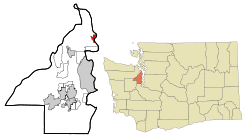Kingston, Washington
| Kingston, Washington | |
|---|---|
| CDP | |
| Nickname(s): Little City by the Sea | |
 Location of Kingston, Washington |
|
| Coordinates: 47°47′56″N 122°29′57″W / 47.79889°N 122.49917°WCoordinates: 47°47′56″N 122°29′57″W / 47.79889°N 122.49917°W | |
| Country | United States |
| State | Washington |
| County | Kitsap |
| Area | |
| • Total | 2.4 sq mi (6.3 km2) |
| • Land | 1.6 sq mi (4.3 km2) |
| • Water | 0.8 sq mi (2.0 km2) |
| Elevation | 69 ft (21 m) |
| Population (2010) | |
| • Total | 2,099 |
| • Density | 977.2/sq mi (377.3/km2) |
| Time zone | Pacific (PST) (UTC-8) |
| • Summer (DST) | PDT (UTC-7) |
| ZIP code | 98346 |
| Area code(s) | 360 |
| FIPS code | 53-35870 |
| GNIS feature ID | 1512350 |
Kingston (formerly Appletree Cove) is a census-designated place (CDP) in Kitsap County, Washington, United States. The population was 2,099 at the 2010 census. Kingston is along the shores of Appletree Cove and the Puget Sound, and is home to a major Washington State Ferries terminal linking it to Edmonds.
Kingston is located at 47°47′56″N 122°29′57″W / 47.79889°N 122.49917°W (47.798764, −122.499071).
According to the United States Census Bureau, the CDP has a total area of 2.4 square miles (6.3 km²), of which, 1.6 square miles (4.3 km²) of it is land and 0.8 square miles (2.0 km²) of it (32.10%) is water.
Founded in 1853 by Benjamin Bannister the community was originally known as Appletree Cove, By 1880 it was a lumber town until the mill closed down in the early 20th century. But the local lumber yard is still in business today, owned by Tom Waggoner. Known as the "Little city by the sea", Kingston is the northern gateway to the Olympic Peninsula. Now it is the social and economic center of the north end of the Kitsap Peninsula.
In 1869, W.S. Ladd and his wife, Caroline built a cabin on Appletree Cove. Michael King then bought the cabin 9 years later. He moved in along with 10 oxen and 10 men. They slowly logged the hills around Appletree Cove. Mr. King built many small buildings and shacks along the shore for his men and animals. In 1882, he was done and moved on. The shacks and bunkhouses were left behind and lived in by drifters, squatters and old loggers. People living in the area often referred to this as King's Town, probably as a joke. The name slowly evolved into Kingston and stuck.
...
Wikipedia
